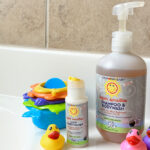Childcare options
As a new mom with powerful protective instincts, it’s hard […]
As a new mom with powerful protective instincts, it’s hard to leave your precious little baby with someone else. Some degree of guilt, jealousy and worry is only natural, but finding childcare you feel good about can ease the transition and give you peace of mind. We’re here to find something nearby that will work for you!
Nanny
A nanny can live with you or commute. A live-in nanny may be paid less in exchange for boarding and perhaps meals and transportation; she essentially becomes a part of the family (but remember that she has her own life too—she needs time and freedom to pursue outside activities). A commuting nanny may cost more than, say, a daycare center, but you maintain the privacy of your home after hours.
Au Pair
“Au pair” is French for “on a par,” meaning that this childcare provider—a foreign young woman taking classes in the United States—is treated as an equal member of the family. Similar to a live-in nanny, an au pair stays with your family and cares for the children for a certain number of hours each week.
You can sign up for an au pair through a reputable service with set standards; you agree to pay a small weekly salary and some educational allowance while acting as a host family to your traveling student for one or two years. If you’re interested in exposing your children to another language and culture, this is a great option. An au pair childcare arrangement is a bit trickier to set up, but the unique experience and value are hard to beat.
Daycare center
Daycare centers vary widely in cost, value and methodology. They’re easy to find (just take a short drive in any urban or suburban area), but make sure you’ve found one you’re comfortable with before you commit. Ask around for suggestions or form your own investigation—it’s OK to visit and important to ask questions:
- What is the teacher to child ratio?
- Is the day structured with learning activities, or do the kids run free most of the time?
- What are the hours? Is there flexibility in drop-off and pick-up times?
- What kind of security is in place?
A visit to a prospective center can make a quick impression about the general vibe of that location, the instructors’ involvement level, sanitation and security. Note that more kids in a room mean more germs being passed around and consequently more sick days for your entire family. On the plus side, a daycare center won’t close at a moment’s notice if an instructor becomes sick or if something comes up (a drawback of single-provider childcare choices).
Prices at daycare centers vary; decide what you want and what you’re willing to pay for it. A good daycare center will provide learning and play in a highly supervised environment where instructors are held to established standards. A daycare center associated with a religious denomination may promote that theology—this can be a plus or a minus depending on your beliefs.
In-home day care
If you’re not comfortable opening your home (or pocketbook) to a nanny but you like the cozy, “just like mom” feel of in-home care, look for an in-home daycare in your area. These are often unlisted, so the best way to find one may be to ask around. Meet with the daycare provider in her home to get a feel for the atmosphere, and again, ask questions:
- How many children do you tend at a time?
- Do you have scheduled activities for the kids?
- Do you allow the kids to watch TV during the day? Do they have outdoor playtime?
- What happens if you are sick or need to go out of town?
In-home daycare is generally a bit more affordable—and more personal—than a daycare center. Like a nanny, the provider is generally unsupervised, so find someone you trust. If you’re lucky enough to have a family member interested in helping out, you may end up with a great deal and a comfortable environment for baby—just make sure both parties respect the boundaries of the relationship.








